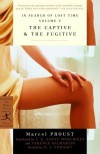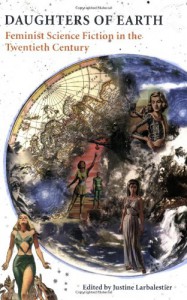Currently reading
Quand un roi perd la France (Les rois maudits, #7)
Antigones
The Captive & The Fugitive
 Mmm, I like Mahir, but I think I liked him better when he wasn't a POV character? This novella could have done with about thirty to fifty pages less of Mahir alternately freaking out and falling asleep like a hyperventilating narcoleptic before the actual story gets going.
Mmm, I like Mahir, but I think I liked him better when he wasn't a POV character? This novella could have done with about thirty to fifty pages less of Mahir alternately freaking out and falling asleep like a hyperventilating narcoleptic before the actual story gets going.Love the zombie kangaroos, though.
 This version of Grant Morrison's Superman has its moments, and I thought it was leaps and bounds above All-Star Superman, which I basically loathed, but I felt like the coherency of the storytelling and my interest in same dropped sharply a few issues in. I really liked the side stories about Steel, a sort of DCverse Iron Man, though.
This version of Grant Morrison's Superman has its moments, and I thought it was leaps and bounds above All-Star Superman, which I basically loathed, but I felt like the coherency of the storytelling and my interest in same dropped sharply a few issues in. I really liked the side stories about Steel, a sort of DCverse Iron Man, though.
 The problem with writing a brilliant and beloved series character is that no one is going to stop revisiting your awkward first novel about him.
The problem with writing a brilliant and beloved series character is that no one is going to stop revisiting your awkward first novel about him.
Solitaire
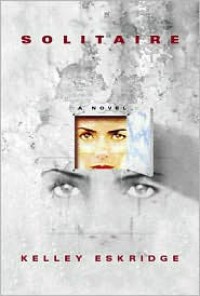 It pains me a bit to be less than excited about a book with such glowing blurbs from Octavia E. Butler and Ursula K. Le Guin, but thus I find myself.
It pains me a bit to be less than excited about a book with such glowing blurbs from Octavia E. Butler and Ursula K. Le Guin, but thus I find myself.The premise is an odd take on the Chosen One trope in fantasy; children born at a very specific time corresponding to the official establishment of an Earth-wide government are earmarked and groomed to take up places in that government in what is openly acknowledged to be an exercise in public relations. Jackal is like a princess who is learning management skills like how to facilitate meetings instead of being instructed in swordplay. It is, if nothing else, a change of pace from the usual.
The most unusual and riskiest portion of the book is the section in the center, which attempts to depict Jackal's years in solitary confinement—actually subjectively induced during a shorter period of time, but still. It seems both too selective to convey the the torture of regular, non-virtual solitary and also kind of a boring slog to read.
Also, while Jackal and her relationships with a few people in her life felt very real, the world she lives in never did, even after she was torn from her privileged position in the literally insular corporate island nation where she was born. I don't buy the world, I don't buy its politics—or, mostly, seeming absence thereof—and I don't buy the final reveal at the end, even though I find much of it engaging and plausible enough on a page to page basis.
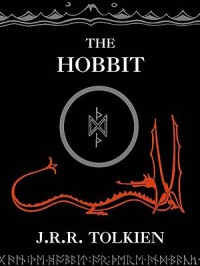 There are people who like LOTR and The Hobbit equally, and there are people who actually prefer The Hobbit.
There are people who like LOTR and The Hobbit equally, and there are people who actually prefer The Hobbit.I…am not either of those kind of people. I just don't get it. At least I made it through my obligatory reread before the next segment of the interminable movie comes out!
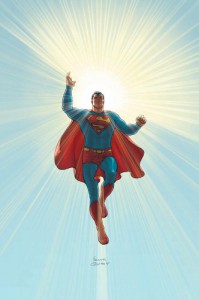 Huh, this is a book that people enjoy? Really? I just don't get it. I guess it's probably better-written than a random collection of twelve issues of Silver Age Superman, but not a significant improvement over a sharp stick in the eye.
Huh, this is a book that people enjoy? Really? I just don't get it. I guess it's probably better-written than a random collection of twelve issues of Silver Age Superman, but not a significant improvement over a sharp stick in the eye.Also, I cannot believe how terrible the art is. Scribbly little lines in all the wrong places that remind me of nothing so much as Rob Liefeld (although admittedly with a much firmer grasp of how objects occupy space and no footphobia or pouchphilia) and the digital coloring costs big money to print but looks cheap and unreal with the stupid plastic-y gradients everywhere. Everyone's clothes look like they are sewn from thick rubber sheets that flop and bulge everywhere. It's distractingly bad.
Invisible Romans: Prostitutes, Outlaws, Slaves, Gladiators, Ordinary Men and Women … the Romans that History Forgot
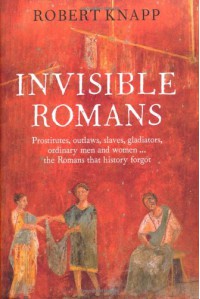 This is an enjoyable and readable book, although forced into a somewhat contorted shape by the author's choice to leave all texts produced by the Roman elites strictly alone, which leaves him with a very constrained selection of 'inscriptions and papyri, and [...] admittedly problematic insights from fiction, fable, Christian sources, fortune-telling and magic', not to mention the chapter where he just straight-up talks about 17th century pirates because there are good sources and he thinks they were pretty similar to Roman pirates as far as we know and come on, pirates, who doesn't want to read about pirates? I have to admit, I did enjoy the pirates.
This is an enjoyable and readable book, although forced into a somewhat contorted shape by the author's choice to leave all texts produced by the Roman elites strictly alone, which leaves him with a very constrained selection of 'inscriptions and papyri, and [...] admittedly problematic insights from fiction, fable, Christian sources, fortune-telling and magic', not to mention the chapter where he just straight-up talks about 17th century pirates because there are good sources and he thinks they were pretty similar to Roman pirates as far as we know and come on, pirates, who doesn't want to read about pirates? I have to admit, I did enjoy the pirates.
 Like all anthologies, this was difficult for me to rate because it was all over the map in terms of enjoyment for me.
Like all anthologies, this was difficult for me to rate because it was all over the map in terms of enjoyment for me.Some standouts both good and bad:
I really liked Delia Sherman's titular "Queen Victoria's Book of Spells", which was both an interesting story and a magical world that I would enjoy reading more of.
"Phosphorus" made a deep impression on me as both an explicitly didactic story about Lucifer matches, "phossy jaw" and the match factory workers' strike and a creepy story about love, magic and sacrifice.
Cat Valente's story about the young Brontë siblings, "Without Us Were Shadows", is clever and bittersweet, and I especially like the relationship between Charlotte and Branwell.
"Estella Saves the Village" is a delightful story by Theodora Goss about rescuing beleaguered characters with a massive crossover fix-it fic that takes on an existence of its own.
I was super disappointed by Ellen Kushner and Caroline Stevermer's collaborative effort, "The Vital Importance of the Superficial". They wrote it by exchanging letters because Kushner was looking to break some writer's block, and I think it should have been rewritten after they figured out what it was going to be about or just stuck in a drawer as a writing exercise.
Elizabeth Wein's "For the Briar Rose" is exquisitely researched and footnoted, but basically nothing happens in it.
Geoffrey Maguire has written some of the most bizarre A Christmas Carol fanfiction I have ever encountered. Have you ever wondered what would happen if Scrooge had had children whom he neglected because he was too busy distributing charity? Probably not, and "A Few Twigs He Left Behind" is unlikely to increase your level of interest in the matter.
 I suppose, theoretically, that I would have aced AP American History even if I had not nigh-memorized this book at an impressionable age, but I would not have derived nearly as much enjoyment from
I suppose, theoretically, that I would have aced AP American History even if I had not nigh-memorized this book at an impressionable age, but I would not have derived nearly as much enjoyment fromTHE HAWLEY-SMOOT TARIFF
without it.
Switch Bitch
 I like most of Roald Dahl's short stories for adults, but I think the four in this collection are about the weakest in the bunch. I guess this is why I don't read Playboy, even for the articles.
I like most of Roald Dahl's short stories for adults, but I think the four in this collection are about the weakest in the bunch. I guess this is why I don't read Playboy, even for the articles.
Celebrating children's books: Essays on children's literature in honor of Zena Sutherland
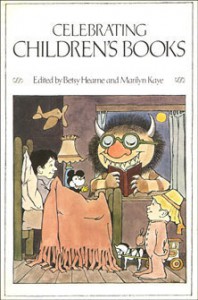 I checked this book out for E.L. Konigsburg's contribution, "Ruthie Britten and Because I Can," those being her answers to the question "Why do you write children's books?" Any of the authors' essays are worth a look, especially for people who are interested in any of the contributors. David Macaulay has a wickedly funny essay about creating children's nonfiction picture books, filled with dubious wisdom such as "Any clues in a picture, for instance, that might increase a child's awareness of and sensitivity toward his or her environment should be completely removed."
I checked this book out for E.L. Konigsburg's contribution, "Ruthie Britten and Because I Can," those being her answers to the question "Why do you write children's books?" Any of the authors' essays are worth a look, especially for people who are interested in any of the contributors. David Macaulay has a wickedly funny essay about creating children's nonfiction picture books, filled with dubious wisdom such as "Any clues in a picture, for instance, that might increase a child's awareness of and sensitivity toward his or her environment should be completely removed."I didn't find the essay on nonsense verse illuminating at all. Ursula Nordstrom's essay on editing children's books is magnificent, although of course a lot of the specific business advice is centuries out of date now. The same goes for a lot of the pieces at the end about the children's book business, which are at best historical artifacts at this point.
The marble in the water: Essays on contemporary writers of fiction for children and young adults
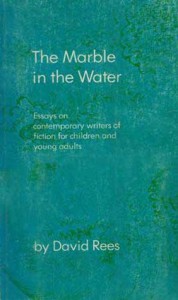 This book's misleadingly-formatted table of contents led it to be catalogued in WorldCat under the names of the authors who are in fact the subjects of very tedious and shallow analysis by the actual sole author, David Rees. As his critical style consists of making unsupported Word of God pronouncements about everything and as I was not in sympathy with a single one of his judgments I put this book back down again very quickly.
This book's misleadingly-formatted table of contents led it to be catalogued in WorldCat under the names of the authors who are in fact the subjects of very tedious and shallow analysis by the actual sole author, David Rees. As his critical style consists of making unsupported Word of God pronouncements about everything and as I was not in sympathy with a single one of his judgments I put this book back down again very quickly.
 Damon Runyon is nothing less than our American P. G. Wodehouse, and if there is any higher compliment I can be paying him it is not coming to me at this precise moment, but if it is striking me sometime in the future I will not hesitate to edit it in, as I am not wishing to understate the matter.
Damon Runyon is nothing less than our American P. G. Wodehouse, and if there is any higher compliment I can be paying him it is not coming to me at this precise moment, but if it is striking me sometime in the future I will not hesitate to edit it in, as I am not wishing to understate the matter.


